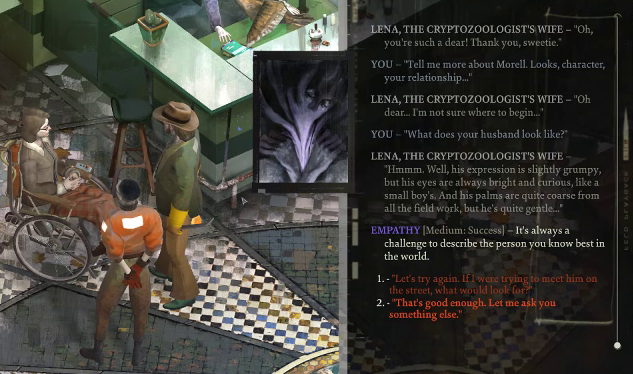Trending
Opinion: How will Project 2025 impact game developers?
The Heritage Foundation's manifesto for the possible next administration could do great harm to many, including large portions of the game development community.

Featured Blog | This community-written post highlights the best of what the game industry has to offer. Read more like it on the Game Developer Blogs or learn how to Submit Your Own Blog Post
How Disco Elysium turns information into gameplay.


This blog post was originally published on my Medium.
Before I get into the interjection mechanic, we need to go back in time.
In the 1910s and ‘20s, Lev Kuleshov demonstrated a film editing effect using a sequence of shots. In the first shot, there was a plate of soup. Then, a man’s expression. A girl in a coffin. The expression of the same man. A woman on a couch. And finally, the man again. Depending on what they were shown, the viewers thought the man was hungry (in the case of the soup), grieving (the girl), or desirous (the woman). Every shot of the man was the same. The only difference was the preceding shot. This psychological effect, called the Kuleshov effect, shows how context affects how people derive meaning from an experience.
 Kuleshov’s demonstration. For full effect, check out the video!
Kuleshov’s demonstration. For full effect, check out the video!
The Kuleshov effect appears in branching game narratives and serves two purposes: the first, to make choices feel impactful; the second, to constrain the plot. Take the following example game. A character will betray the protagonist at a specific point in the plot. The player can make choices that affect their relationship with that character. One set of choices are “Good”. The player helps them, and the character responds kindly. When the betrayal happens, that character is a manipulative schemer. The other set of choices are “Evil”. The player harms them, and the character distances themselves. How do you think the character is perceived now? They’re a justified traitor.
To constrain the plot, player choices can be categorized under the Kuleshov effect as the context shot (the first shot, a.k.a. the bowl of soup). The betrayal is the to-be-interpreted shot (the second shot, a.k.a. the man’s expression). The player is given free rein to do whatever they like in the first shot, but not in the second shot. This helps us make decisions about what choices the player can make. For example, there can’t be a choice to kill the betrayer, because the second shot requires them to be alive. This limits what impact the player can have on the plot, while giving them the opportunity to explore their own story.
Now back to post-Disco Elysium. DE is an RPG and, as such, has character stats. These aren’t your typical D&D stats like strength, wisdom, charisma, etc. DE’s stats are things like empathy, encyclopedia, and authority. The more points the player puts into these skills, the better the character is at them and the more affected the character is by them. If you haven’t played, you might ask: “How can the player character be affected by empathy?” The answer is: the interjections.
 Empathy interjecting [Disco Elysium 2019]
Empathy interjecting [Disco Elysium 2019]
The interjections are the dialogue lines that are interjected by the player character’s stats. For example, if the character has high empathy, Empathy will pipe up during conversations with something like, “He’s trying not to show it, but he’s upset by the corpse in the backyard.” Then, when the player gets their usual dialogue choices, they’re now evaluating them based on what Empathy had to say. The fun bits in the game happen when two stats suggest different courses of action, like if Empathy says to watch out because they’re on the brink of crying, and Authority says to push them over it.
Why are the choices in Disco Elysium so much more compelling than in the example betrayal game? To recall, in the example game, the player’s choices comprise the context shot. The inevitable betrayal is the to-be-interpreted shot. In Disco Elysium, the interjections act as the context shot, so that the dialogue choices can be the to-be-interpreted shot. The player’s choices are no longer the context. By inverting the shot the player acts in, the player’s choices suddenly have more meaning.
Lesson: Acting with context creates meaning.
The interjections are the Kuleshov effect at work on a more micro-level. The dialogue options the player receives have their context influenced by what their character’s stats are. Why it’s so effective is that the Kuleshov effect this time around is not merely perception. It’s utility. The player can act on it. It’s a Kuleshov effect of gameplay.
-- Stephen Trinh (@stephentrinha)
Read more about:
Featured BlogsYou May Also Like